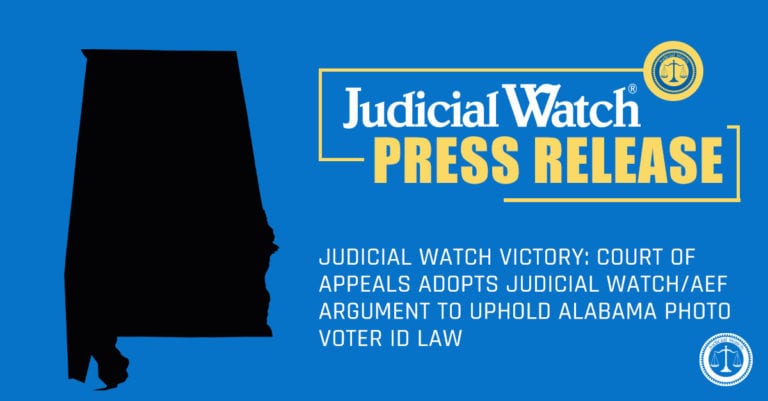
Judicial Watch Victory: Court of Appeals Adopts Judicial Watch/AEF Argument to Uphold Alabama Photo Voter ID Law

Court Rules Law Does Not Violate 14th or 15th Amendments or Voting Rights Act
(Washington, DC) – Judicial Watch today announced that the U.S. Court of Appeals for the Eleventh Circuit adopted the argument put forth by Judicial Watch and Allied Educational Foundation (AEF) in their amici curiae brief when it upheld Alabama’s 2011 Photo Voter Identification Law. The court ruled the law does not violate the 14th or 15th Amendments or the Voting Rights Act and that the anti-voter ID plaintiffs failed to demonstrate the Alabama law causes the denial or abridgment of the right to vote on account of race.
The appellate panel majority found:
The burden of providing a photo ID … in order to vote is a minimal burden on Alabama’s voters—especially when Alabama accepts so many different forms of photo ID and makes acquiring one simple and free for voters who lack a valid ID but wish to obtain one.
The Circuit Court’s ruling affirmed a lower-court ruling in Greater Birmingham Ministries, et al. v. Secretary of State of Alabama (No. 2:15-cv-02193), in which the U.S. District Court for the Northern District of Alabama upheld the Alabama Voter Photo ID Law in a decision handed down January 10, 2018. When the plaintiffs appealed the ruling, Judicial Watch, in conjunction with AEF, filed an amici curiae brief supporting the Act’s constitutionality.
In our April 2018 amici brief to the Appeals Court, Judicial Watch and AEF explained succinctly why the Appellate Court should sustain the District Court’s decision and uphold the Alabama law.
The District Court in this case properly focused on Appellants’ [Greater Birmingham Ministries] failure to show a discriminatory “result”… let alone a discriminatory impact sufficient to rise to the level of a denial or abridgment of an equal opportunity “to participate in the political process and to elect representatives of choice.”
In other words, as the Judicial Watch/AEF brief argues:
A racially disproportionate impact is not enough; nor is a history of discrimination; nor are the two in combination. Quite simply, the challenged ID procedure must be shown by plaintiffs to cause discriminatory results in order to prove a Section 2 [of the Voting Rights Act] “results” [disparate-impact] claim.
The Eleventh Circuit panel agreed with Judicial Watch and AEF’s analysis in upholding the voter id law.
In this case, there is no evidence that the challenged law either “resulted in” the denial or abridgment of the right to vote or that any such denial or abridgment of the right to vote was “on account of race or color” under Section 2(a). Lacking a showing of evidence necessary to demonstrate the “sort of causal connection between racial bias and disparate effect necessary to make a vote-denial claim” dooms Plaintiff’s claims.
“As we argued to the court, voter ID is good policy and protects the votes of all voters,” said Judicial Watch President Tom Fitton. “The Left is dishonestly playing the race card to try to stop common sense voter ID measures in Alabama and elsewhere. We’re pleased that we were able to help the Court see through the canard that voter ID requirements harm any American voters.”
The issue addressed by the Eleventh Circuit is also currently before the U.S. Supreme Court on a petition for review. In Mark Brnovich, et al. v. Democratic National Committee, et al. (No. 19-1257), Judicial Watch and AEF submitted an amici brief making arguments similar to those that carried the day in the Alabama case. Their brief contends that the Ninth Circuit Court of Appeals erred in ruling that Arizona’s neutral regulations designed to protect the integrity of its elections had discriminatory results even though the court never found that the regulations actually caused any alleged discrimination.
The Allied Educational Foundation is a charitable and educational foundation dedicated to improving the quality of life through education. In furtherance of that goal, the Foundation has engaged in a number of projects, which include, but are not limited to, educational and health conferences domestically and abroad. AEF has partnered frequently with Judicial Watch to fight government and judicial corruption and to promote a return to ethics and morality in the nation’s public life.
###
















